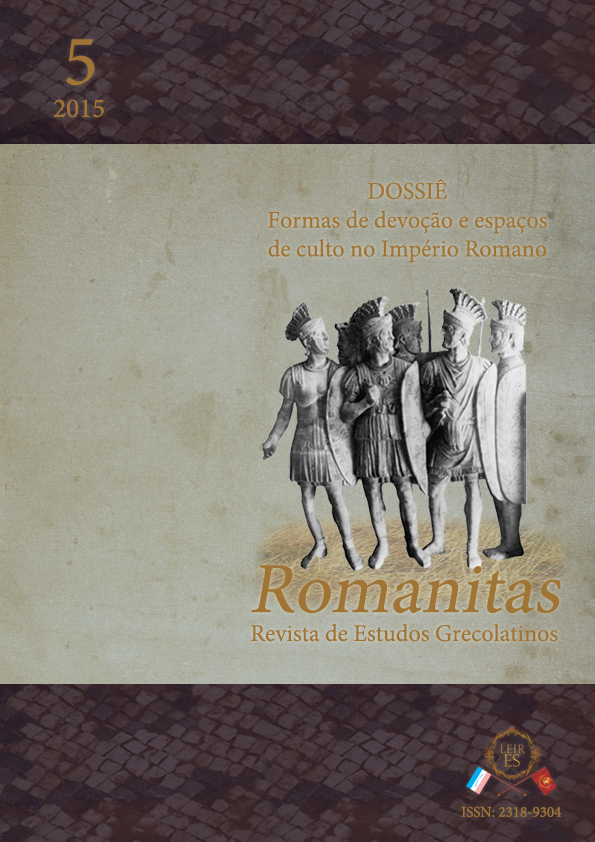O elemento religioso na interpretação dos acontecimentos da 'Guerra pérsica'
DOI:
https://doi.org/10.17648/rom.v0i5.11217Palavras-chave:
Império Bizantino, Procópio de Cesareia, Tykhe, DeusResumo
Procópio de Cesareia, historiador bizantino, retratou o governo de Justiniano no século VI d.C. de forma muito distinta. Ao narrar as ações do imperador, o autor disponibilizou um conjunto heterogêneo de informações religiosas que ainda leva muitos historiadores a discutir o significado de suas crenças e a importância da providência divina na interpretação dos acontecimentos. O objetivo deste artigo é enfatizar o elemento religioso na Guerra pérsica, discutindo o uso de imagens cristãs, de caráter fatalista, como ferramenta de crítica ao imperador Justiniano e o papel de Deus e da sorte na explicação dos acontecimentos.Downloads
Referências
Documentação textual
AFTÔNIO. Progymnasmata. Traduit par Michel Patillon. Paris: Les Belles Lettre, 2008.
AGATIAS. The histories. Trad. Joseph D. Frendo. Alemanha: de Gruyter, 1975.
HOMERO. Iliade. Traduit par Eugène Bareste. Paris: Libraire-éditeur, 1843.
JUSTINIANO. Corpus Juris Civilis. Tradução de S. P. Scott. Cincinnati: Central Trust Company, 1932.
PROCÓPIO. History of the war. English translation by H. B. Dewing. Cambridge: Harvard University Press, 2006.
______. Buildings. English translation by H. B. Dewing. Cambridge: Harvard University Press, 1996.
______. Secret History. English translation by H. B. Dewing. Cambridge: Harvard University Press, 1935.
TUCÍDIDES. History of the Peloponnesian War. Translated by Charles Forster Smith. Cambridge: Harvard University Press, 1962.
Obras de apoio
BAPTISTA, L. V. O Logos da Guerra Pérsica: uma análise da perspectiva histórica da obra de Procópio de Cesareia (VI d.C.). 2013. Tese (Doutorado em História) – Programa de Pós-Graduação em História da Universidade Federal do Rio Grande do Sul, Porto Alegre, 2013.
BITTON-ASHKELONY, B.; KOFSKY, A. The monastic school of Gaza. Leiden: Brill, 2006.
BLICKMAN, D. R. The role of the plague in the “Iliad”. Classical Antiquity, v. 6, n. 1, p. 1-10, 1987.
BRIDGES, E.; HALL, E.; RHODES, P. J. Cultural responses to the Persian Wars: Antiquity to the Third Millennium. Oxford: University Press, 2007.
CAMERON, A. New Themes and styles in Greek literature, a title revisited. In.: JOHNSON, S. F. (Ed.). Greek literature in late antiquity: dynamism, didacticism, classicism. Hampshire: Ashgate, 2006 p. 11-28.
______. Procopius and the sixth century. London: Routledge, 1996.
______. Christianity and tradition in the historiography of the Late Empire. The Classical Quarterly, v. 14, n. 2, p. 316-328, 1964.
DIGNAS, B.; WINTER, E. Rome and Persian in Late Antiquity: neighbours and rivals. Cambridge: University Press, 2007.
DOWNEY, G. Paganism and Christianity in Procopius. Church History, v. 18, n. 2, p. 89-102, 1949.
EVANS , J. A. S. The age of Justinian. London: Routledge, 1996.
______. Procopius. New York: Twayne Publishers, 1972.
______. Procopius of Caesarea and the Emperor Justinian. Historical Papers/Communications historiques, vol. 3, n. 1, p. 126-139, 1968.
FRAKES, J. C. The fate of fortune in the Early Middle Ages: the Boethian tradition. Leiden: E. J. Brill, 1988.
GIBBON, E. The history of the decline and fall of the Roman Empire. Boston: Phillips, Sampson, and Company, 1985.
GONZÁLEZ FERNÁNDEZ, R. Las estructuras ideológicas del Código de Justiniano. Murcia: Universidad de Murcia, 1997.
GREATREX, G. Procopius the outsider? In.: SMYTHE, D. C. (Ed.). Strangers to themselves: the Byzantine Outsider: Papers from the Thirty-Second Spring Symposium of Byzantine Studies, University of Sussex, Brighton, mar. 1998. Aldershot: Ashgate, 2000, p. 215-228.
GURAN, P. Eschatologie et théologie politique dans les derniers siècles de Byzance. Revue des études Sud-est européennes, 2007, v. 45, n. 1-4, p. 73-85.
HOWARD-JOHNSTON, J. The education and expertise of Procopius. Antiquité Tardive, 8, p. 19-30, 2000.
KALDELLIS, A. Procopius’ Persian War: a thematic and literary analysis. In.: MACRIDES, R. (Ed.). History as literature in Byzantium: papers from the Fortieth Springs Symposium of Byzantine Studies, University of Birmingham. Surrey: Ashgate, 2010, p. 253-273.
KALDELLIS, A. Procopius of Caesarea: tyranny, history, and philosophy at the end of Antiquity. Philadelphia: University of Pennsylvania Press, 2004.
KAZDHAN, A.; CONSTABLE, Giles. People and power in Byzantium: an introduction to modern studies. Washington: Dumbarton Oaks Center, 1996.
KOUROÚMALI, M. Procopius and the Gothic War. 2005. Thesis (Doctorate on Philosophy) - Corpus Christi College and History Faculty, University of Oxford, Oxford, 2005.
KRUMBACHER, K. The history of Byzantine Literature: from Justinian to the end of the Eastern Roman Empire (527-1453). Notre Dame: University of Notre Dame, 2001.
MAIER, F. G. Bizancio. México: Siglo Veintiuno, 1991.
MARÍN CONESA, R. Determinismo y contingencia en la obra historiográfica de Procópio Cesariense: la significación de Tykhē y Zeos. Lengua e historia, v. 9/10, p. 143-162, 1995.
PAZDERNIK, C. F. Justinianic ideology and the power of the past. In. MAAS, M. (Ed.). The Cambridge Companion to the Age of Justinian. Cambridge: Cambridge University Press, 2005, p. 185-214.
TREADGOLD, W. The early Byzantine historians. London: Palgrave Macmillan, 2010.
TROMBLEY, F. R. Christianity and paganism, II: Asia Minor. In.: CASIDAY, A.; NORRIS, F. W. (Eds.). The Cambridge history of Christianity: Constantine to c. 600. Cambrigde: Cambrigde University Press, 2007, p. 189-209.
Downloads
Publicado
Como Citar
Edição
Seção
Licença
Copyright (c) 2015 Romanitas - Revista de Estudos Grecolatinos

Este trabalho está licenciado sob uma licença Creative Commons Attribution-NonCommercial-NoDerivatives 4.0 International License.
a. Os autores mantêm os direitos autorais e concedem à revista o direito de primeira publicação.
b. Os autores têm autorização para assumir contratos adicionais separadamente, para distribuição não-exclusiva da versão do trabalho publicada nesta revista (ex.: publicar em repositório institucional ou como capítulo de livro), com reconhecimento de autoria e publicação inicial nesta revista.
c. Autores têm permissão e são estimulados a publicar e distribuir seu trabalho online (ex.: em repositórios institucionais ou na sua página pessoal) após a primeira publicação pela revista, com os devidos créditos.
d. Os textos da revista estão licenciados com uma Licença CC BY 4.0 Deed Atribuição 4.0 Internacional (CC BY).




























